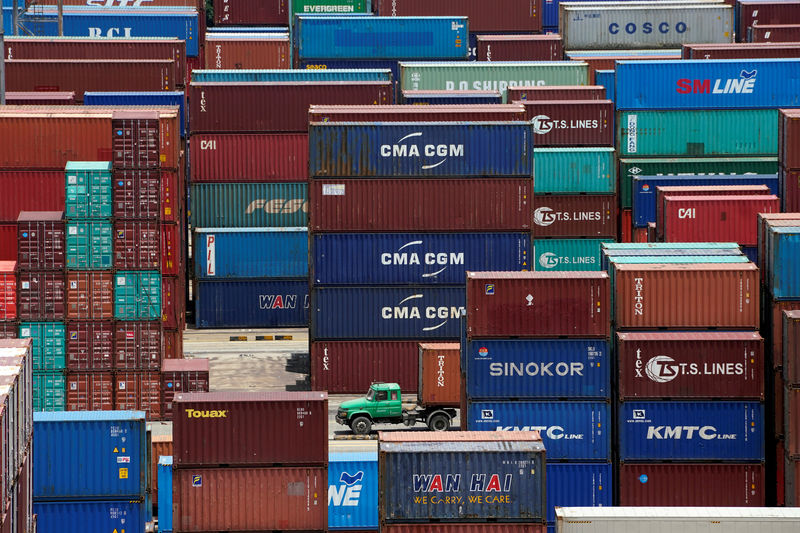By Rahul Karunakar and Leika Kihara
BENGALURU/TOKYO (Reuters) - Growth in factory activity slowed across Europe and Asia in September, with export orders weakening before the latest escalation in the U.S.-China trade conflict, in another sign the global economy is shifting into lower gear.
Business surveys released on Sunday and Monday showed the pace of expansion slowing across European and Asian factories. Gauges of future activity offered little hope for a turnaround in the next few months.
Some of the gloom will be offset by news that the United States and Canada clinched a deal on Sunday to salvage the North American Free Trade Agreement, removing one near-term risk to the global outlook.
But with neither Beijing nor Washington ready to compromise and the latest tariffs on each other's goods already imposed, that conflict is a worrying backdrop to a weakening factory expansion in Europe and Asia.
Manufacturing growth in the euro zone slowed to a two-year low at the end of the third quarter, according to the latest IHS Markit purchasing managers' indices.
"Overall, the picture remains for a less buoyant manufacturing sector in Q3, with not very strong signs yet of a better outlook for the end of the year," noted Nicola Nobile, a senior economist at Oxford Economics.
"A slowdown in world trade and continuing concerns about the escalation of trade tensions between the U.S. and China continue to weigh on manufacturing sentiment."
German manufacturing growth slowed to just over a two-year low in September, grew at the slowest pace in three months in France and stagnated in Italy, marking the first time in two years of no expansion.
Weaker export order growth was a common explanation for the slowdown across the euro zone.
And while British factories perked up unexpectedly in September, halting a three-month run of slowing growth, the bigger picture was subdued performance, just six months before the UK is scheduled to leave the European Union.
ASIA GROWTH FALTERING
Two manufacturing surveys from China on Sunday pointed to weakening in its vast manufacturing sector. A private poll showed factory growth stalled after 15 months of expansion, while an official gauge confirmed manufacturing was losing steam under the weight of shrinking export orders.
The first major readings on China for September suggest the world's second-largest economy is continuing to lose momentum as domestic demand weakens and U.S. tariffs bite. The combination is likely to prompt Beijing to roll out more growth-support measures in coming months.
However, analysts don't expect additional stimulus to start stabilizing China's economy until at least early next year.
Elsewhere in Asia, manufacturing also faltered in Vietnam, Taiwan and Indonesia last month, with Taiwan's factories expanding at the slowest pace in more than two years on sluggish export orders, business surveys showed on Monday.
Major economies like Japan and South Korea saw headline activity readings hold up, but also suffered declines in export orders, suggesting that increasing protectionism and concerns of slowing Chinese demand were weighing on Asia's biggest economies.
"Global growth is now cooling, which we think is weighing on foreign demand for Chinese goods irrespective of tariffs," Capital Economics said in a note to clients.
India was among the few bright spots in Asia. Its factory activity expanded more quickly in September on strong domestic and export order growth, a welcome sign as policymakers worry about a sharp drop in the rupee and fallout from global trade frictions.
While rising protectionism is expected to deal the world economy a relatively modest blow this year, analysts expect risks will intensify in 2019 as tougher U.S. tariffs kick in and global borrowing costs rise.
"Countries that saw their currencies slump may be suffering from rising import costs. There are also signs China's slowdown and the trade friction are starting to hurt sentiment," said Koji Kobayashi, senior economist at Mizuho Research Institute.

"It would take time for companies to relocate production from China to other countries. That means the initial impact of the trade friction on Asian economies would be negative."